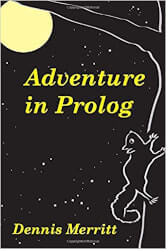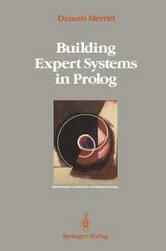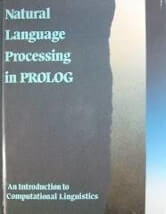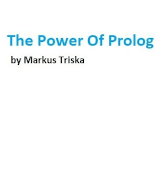Last Updated on December 25, 2024
5. Adventure in Prolog by Dennis Merritt
 A Prolog tutorial that uses the very first interactive computer games to teach the expressive power of Prolog.
A Prolog tutorial that uses the very first interactive computer games to teach the expressive power of Prolog.
This book is aimed at the programmer who wishes to learn the advantages of programming in Prolog. It takes a pragmatic, rather than theoretical, approach to the language and is designed for programmers interested in adding this powerful language to their bag of tools.
This book is not published under an open source license.
6. Building Expert Systems in Prolog by Dennis Merritt

Dennis Merritt explains the basic principles, as well as the specialized knowledge representation and processing techniques that are indispensable for the implementation of industrial software.
The book is useful for the professional developer of industrial knowledge-based applications, as well as for the student or programmer interested in learning about or building expert systems.
This book is not published under an open source license.
7. Natural Language Processing Techniques in Prolog by Patrick Blackburn and Kristina Striegnitz

This book introduces the subject through the discussion and development of various computer programs which illustrate some of the basic concepts and techniques in the field.
The programming language used is Prolog, which is especially well-suited for Natural Language Processing and those with little or no background in computing.
Following the general introduction, the first section of the book presents Prolog, and the following chapters illustrate how various Natural Language Processing programs may be written using this programming language.
8. The Power of Prolog by Markus Triska
 The goal of this material is to bridge the gap between the great traditional Prolog textbooks of the past and the language as it currently is, several decades after these books were written.
The goal of this material is to bridge the gap between the great traditional Prolog textbooks of the past and the language as it currently is, several decades after these books were written.
You will see that many limitations of the past are no longer relevant, while several new constructs are now of great importance even though they are not yet covered in any available Prolog book.
This book is self-hosting: It includes an HTTP server that lets you browse most of the content locally.
Next page: Page 3 – Warren’s Abstract Machine: A Tutorial Reconstruction and more books
Pages in this article:
Page 1 – Simply Logical and more books
Page 2 – Adventure in Prolog and more books
Page 3 – Warren’s Abstract Machine: A Tutorial Reconstruction and more books
Page 4 – Prolog Techniques and more books
All books in this series:
| Free Programming Books | |
|---|---|
| Ada | ALGOL-like programming language, extended from Pascal and other languages |
| Agda | Dependently typed functional language based on intuitionistic Type Theory |
| Arduino | Inexpensive, flexible, open source microcontroller platform |
| Assembly | As close to writing machine code without writing in pure hexadecimal |
| Awk | Versatile language designed for pattern scanning and processing language |
| Bash | Shell and command language; popular both as a shell and a scripting language |
| BASIC | Beginner’s All-purpose Symbolic Instruction Code |
| C | General-purpose, procedural, portable, high-level language |
| C++ | General-purpose, portable, free-form, multi-paradigm language |
| C# | Combines the power and flexibility of C++ with the simplicity of Visual Basic |
| Clojure | Dialect of the Lisp programming language |
| ClojureScript | Compiler for Clojure that targets JavaScript |
| COBOL | Common Business-Oriented Language |
| CoffeeScript | Transcompiles into JavaScript inspired by Ruby, Python and Haskell |
| Coq | Dependently typed language similar to Agda, Idris, F* and others |
| Crystal | General-purpose, concurrent, multi-paradigm, object-oriented language |
| CSS | CSS (Cascading Style Sheets) specifies a web page’s appearance |
| D | General-purpose systems programming language with a C-like syntax |
| Dart | Client-optimized language for fast apps on multiple platforms |
| Dylan | Multi-paradigm language supporting functional and object-oriented coding |
| ECMAScript | Best known as the language embedded in web browsers |
| Eiffel | Object-oriented language designed by Bertrand Meyer |
| Elixir | Relatively new functional language running on the Erlang virtual machine |
| Erlang | General-purpose, concurrent, declarative, functional language |
| F# | Uses functional, imperative, and object-oriented programming methods |
| Factor | Dynamic stack-based programming language |
| Forth | Imperative stack-based programming language |
| Fortran | The first high-level language, using the first compiler |
| Go | Compiled, statically typed programming language |
| Groovy | Powerful, optionally typed and dynamic language |
| Haskell | Standardized, general-purpose, polymorphically, statically typed language |
| HTML | HyperText Markup Language |
| Icon | Wide variety of features for processing and presenting symbolic data |
| J | Array programming language based primarily on APL |
| Java | General-purpose, concurrent, class-based, object-oriented, high-level language |
| JavaScript | Interpreted, prototype-based, scripting language |
| Julia | High-level, high-performance language for technical computing |
| Kotlin | More modern version of Java |
| LabVIEW | Designed to enable domain experts to build power systems quickly |
| LaTeX | Professional document preparation system and document markup language |
| Lisp | Unique features - excellent to study programming constructs |
| Logo | Dialect of Lisp that features interactivity, modularity, extensibility |
| Lua | Designed as an embeddable scripting language |
| Markdown | Plain text formatting syntax designed to be easy-to-read and easy-to-write |
| Objective-C | Object-oriented language that adds Smalltalk-style messaging to C |
| OCaml | The main implementation of the Caml language |
| Pascal | Imperative and procedural language designed in the late 1960s |
| Perl | High-level, general-purpose, interpreted, scripting, dynamic language |
| PHP | PHP has been at the helm of the web for many years |
| PostScript | Interpreted, stack-based and Turing complete language |
| Prolog | A general purpose, declarative, logic programming language |
| PureScript | Small strongly, statically typed language compiling to JavaScript |
| Python | General-purpose, structured, powerful language |
| QML | Hierarchical declarative language for user interface layout - JSON-like syntax |
| R | De facto standard among statisticians and data analysts |
| Racket | General-purpose, object-oriented, multi-paradigm, functional language |
| Raku | Member of the Perl family of programming languages |
| Ruby | General purpose, scripting, structured, flexible, fully object-oriented language |
| Rust | Ideal for systems, embedded, and other performance critical code |
| Scala | Modern, object-functional, multi-paradigm, Java-based language |
| Scheme | A general-purpose, functional language descended from Lisp and Algol |
| Scratch | Visual programming language designed for 8-16 year-old children |
| SQL | Access and manipulate data held in a relational database management system |
| Standard ML | General-purpose functional language characterized as "Lisp with types" |
| Swift | Powerful and intuitive general-purpose programming language |
| Tcl | Dynamic language based on concepts of Lisp, C, and Unix shells |
| TeX | Markup and programming language - create professional quality typeset text |
| TypeScript | Strict syntactical superset of JavaScript adding optional static typing |
| Vala | Object-oriented language, syntactically similar to C# |
| VHDL | Hardware description language used in electronic design automation |
| VimL | Powerful scripting language of the Vim editor |
| XML | Rules for defining semantic tags describing structure ad meaning |
